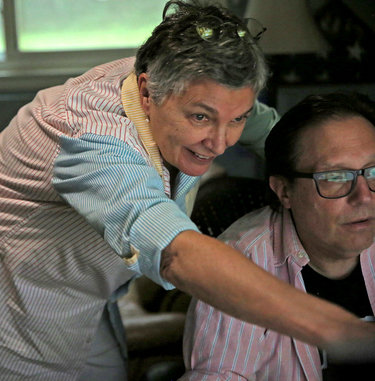Chris Howard is documenting ‘stories that the world needs to hear’
VOORHEESVILLE — Life and art are often intertwined for Chris Howard.
She sees communication as a common thread in her life, taking her from parts she played in the school productions of her childhood through a career as a speech and language pathologist, to a never-ending passion for community theater and now founding a company to make a documentary about local activists.
Howard first trod the boards as a Voorheesville Elementary School fifth-grader, playing the part of Alice in “Alice in Wonderland” — her mother made her costume.
Before she graduated from high school, Howard had directed Noel Coward’s “Blithe Spirit” and donated the proceeds to the Heldeberg Workshop.
The last play she directed, for the Schenectady Civic Players, just before the pandemic caused a halt to productions, was, like “Blithe Spirit,” written in the midst of World War II — “The Madwoman of Chaillot.” As Nazis occupied Paris, journalist and playwright Jean Giraudoux wrote the play produced after his death.
The Countess Aurelia, the madwoman of the title, is herself an activist, standing up against corrupt businessmen planning to drill for oil beneath the streets of Paris.
Howard found her career through a part she played as a Voorheesville high school student. She was the lead, Annie Sullivan, in “The Miracle Worker,” a play based on Helen Keller’s autobiography. Sullivan arrives from Boston at the Kellers’ wealthy Alabama home to find 6-year-old Helen, deaf and mute, tyrannizing the household.
Sullivan opened the world to Helen Keller, by giving her the ability to communicate.
The play opened Howard’s mind to becoming a speech pathologist, a course she pursued at the State University of New York at Fredonia. The play also foretold her romantic future. “The kid who played the doctor is now my husband — and he’s a doctor — that’s Richard Howard, my wonderful husband,” she said.
Having played the part of Annie Sullivan, the young Chris Howard went to observe a well-known speech therapist at work with children. She came to observe on a day he was testing.
“It blew my mind,” recalled Howard.
He was administering the Peabody Picture Vocabulary Test during which he would say a word and the child being tested would point to a picture — one of four on a page — of that word.
“So here was a miracle to me that a child who could not speak could show us what they know simply by showing their level of ability with receptive language ….,” said Howard. “I knew what I wanted to be.”
Howard, who is still licensed as a speech language pathologist, worked in both school and hospital settings as well as in private practice.
What drove her to make a documentary was capturing the stories of activists, some of whom started their work in the 1950s. Like Alice — Howard’s first on-stage role — she has fallen down a rabbit hole to find a new world filled with memorable characters.
And, as in the last play she directed, Howard, like the madwoman of Chaillot, has taken on a formidable task.
“We feel so determined and motivated and inspired to capture those stories, share them with the world, save them forever because these are stories that the world needs to hear,” says Howard in this week’s Enterprise podcast.
To make the documentary, she founded a not-for-profit company called Surefooted Films. Its logo comes from an old photograph of her father on top of a very tall, slender tree, arms spread wide, as if he may take flight.
“Each of us, young and old, is part of history,” wrote Howard on the home page of her company’s website, next to the picture of her late father, in silhouette. “To climb to the top of this tree, my dad strapped spikes to the inside of his boots. Struggle. Triumph! Repeat.”
Howard said of the name she chose for her film company, “We want to create confidence. We’re a new company. We want people to be confident in us.”
Howard was inspired by StoryCorps, David Isay’s not-for-profit founded in 2003, which in turn was inspired by the Works Progress Administration recordings of oral histories from across the United States in the 1930s. Both the interviews recorded by StoryCorps and the WPA interviews made during the Great Depression are archived at the Library of Congress for future generations to hear.
Howard is posting filmed interviews of local activists on the Surefooted website. “We’re so determined to create an archive that people can go to for generations, starting with the young people,” she said. “Today, when they write about civil rights, they’ll be able to reference local people who worked so hard and have such great stories.”
Her idea has evolved since its inception. Before the pandemic forced people into isolation, the working title for her documentary was “Talk About Activism.” The goal was to not only interview “wonderful activists from back in their day” but also to “have forums so that young people, teenagers, college students could actually sit down with that generation and have a dialogue … But COVID put the kibosh on that — and so we morphed.”
The documentary now is called “The Activist Next Door,” and is being produced in three parts. Howard, the producer and director of the documentary, has high praise for her film editor, Tony Grocki.
The first part of the documentary is on the civil rights movement; the second part is on the Vietnam war era; and the third part is called “Mayors, Malls, and Butterflies.”
“We will talk about Albany city politics and the struggle to pierce through a curtain of corruption during the Corning era … that spilled over to the pine bush,” said Howard of the third part, adding, “Butterflies refers to the Karner blue butterfly in the pine bush.”
Some of the activists interviewed, like singers and songwriters Reggie Harris and Ruth Pelham, are in more than one part of the documentary.
Howard hefts a heavy binder with over 500 pages of transcription from the score of activist interviews.
The very first interview, in 2019, was with Arlen Westbrook who, in 1957, rented her Delmar home to a Black family — Jim and Margaret Cunningham and their two daughters: Miki, 12, and Fern, 8. Both Margaret Cunningham, an artist, and Westbrook, a social worker, unbeknown to each other, kept journals.
They became lifelong friends and Miki Conn, over a half-century later, put together a book from their two journals titled “Integrating Delmar 1957: The Story of a Friendship.”
In the Surefooted interview, Westbrook says, the book is a “history of a friendship, a history of a place, a history of a time.” She also says she has since learned that, in the 1950s, Delmar had covenants stipulating “you cannot sell to ‘undesirables’ unless they live in your house as a servant.” Among those you couldn’t sell to, Westbrook says, were Catholics, Jews, and Blacks.
Other activists whose stories are part of that first documentary segment are Alice Green, an author, social worker, teacher, and founder of the Center for Law and Justice in Albany, and Earle Thorpe, a doo-wop star and founding member of The Brothers, an Albany civil rights group.
In April, the first part of “The Activist Next Door” will be shown at the Albany Film Festival, hosted by the New York State Writers Institute, Howard said. On Sept. 17, she is hosting a fundraising event at her home on Swift Road where a trailer of the film will be screened.
“We need to get some money coming in because too much money has been going out,” she said. “I’ve been self-funding it on my own … and I’m tapped out.”
The worth of her work will become clear once people see the trailer and the interviews posted on the Surefooted Films website, Howard believes. “People can see the quality of what we’re doing and hopefully say, ‘Oh, yes this is worthy of our financial support.’ … Once we get that base going, we can stand tall and start writing grants.”
She believes once “The Activist Next Door” is completed, it will be useful for schools and for public television.
“We’re all part of history,” Howard concluded. “There are amazing people who have accomplished a lot. Their legacy is wonderful.”


